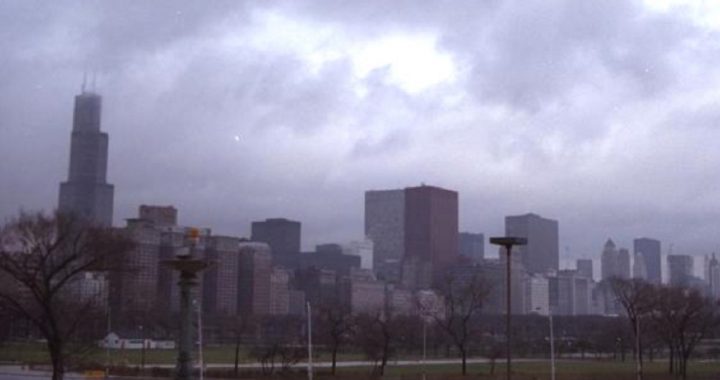
The day after the Illinois state legislature adjourned without dealing with the state’s $100 billion crisis, on Friday, November 8, Fitch Ratings downgraded $8.5 billion of Chicago’s bonds, as well as labeling its outlook for future downgrades as “negative.” Said Fitch: “The city has been unsuccessful in its attempts to negotiate a solution with labor unions [or with] the state legislature, which ultimately controls the benefit formulas [of the state’s pension plans].” This is the second downgrade by Fitch since July, which was matched by a similar downgrade that month by Moody’s Investors Service.
In October and November, the Illinois legislature met for only five days, which left them with precious little time to deal with such things as the state’s nearly $100 billion in unfunded pension liabilities or its $7.5 billion backlog of unpaid bills. But it did keep busy nevertheless, spending money it didn’t have on grant programs and contraceptive services and a $41-million office renovation, along with a new field house. It increased court fees; helped prostitutes gain better access to mental health services; created task forces on school poverty, truancy, and food stamps; and, oh yes, it declared the last week of October as “Dyslexia Awareness Week.” As the Chicago Tribune noted wryly: “Go ahead. Put your hands together. [At least] they did something!”
Chicago’s unfunded pension liabilities were sufficient justification for Chicago Mayor Rahm Emanuel to keep from addressing Chicago’s problems as he was waiting in vain for the Illinois General Assembly to come up with a solution. Meanwhile those problems are pushing Chicago down the same path as Detroit. Chicago owes $14 billion in outstanding general obligation (GO) bonds and another $19.5 billion to the police, firefighters, and municipal employees’ pension plans. Added together that’s four times the city’s annual budget, and doesn’t include the unfunded liabilities that Chicago’s public schools and other agencies owe.
With those downgrades comes another unhappy consequence: The interest that the city must pay on those bonds has risen to the point where the city is paying more in interest than in principal on its GO bonds.
On the same day of the Fitch downgrade a report by The Civic Foundation was published, comparing Chicago to 12 other cities on the basis of its financial solvency. The city ranked 11th out of 13, beating out only Boston and Detroit. Said the report:
During the five-year period [from 2007 to 2011], the City of Chicago’s relative financial condition has worsened compared to most of the twelve other cities in all four areas of solvency [cash, budgets, long-run solvency, and service-level — i.e., police and firefighters — solvency].
Chicago’s ability to generate financial resources in the short term has declined, indicating a weakened cash solvency. Its budgetary solvency is declining as well….
The long-run solvency indicators expose significant challenges for the City to meet its existing long-term obligations.
As The Civic Federation’s President Laurence Msall noted: “If Chicago does not address the structural deterioration of its finances, it is on the road to Detroit.”
The river of denial, however, continues to flow through Chicago’s political and public relations infrastructure. Rachel Shteir, a book reviewer for the New York Times, moved to Chicago 13 years ago, and she still rankles at the hubris and fantasizing engaged in by politicians and the local chamber of commerce, glossing over or avoiding altogether any mention of Chicago’s downward spiral. In April she reviewed three books about Chicago and after reading them she couldn’t contain herself:
Chicago never ceases to boast about itself. The Magnificent Mile! Fabulous architecture! The MacArthur Foundation! According to The Tribune, Chicago is” America’s hottest theater city.”
Nothing in those three books mentioned the fact that in 2012 Chicago had the second-highest murder and sales tax rates in the country. Nothing was said about the city’s ninth-highest foreclosure rate. Only one mentioned anything about four of the state’s last seven governors having gone to jail on corruption charges. Not a word about the decline in the city’s population, currently at 2.7 million, down from 3.6 million in 1950. She added:
But the bloviating roars on, as if hot air could prevent Chicago from turning into Detroit.
The real culprits behind and beneath Chicago’s demise are Chicago’s poor economy, machine politics going back decades, uncompromising unions, and politicians determined to stay in office while selling out future generations. In addition it’s the fantasy that things will somehow get better. According to the Chicago Tribune in a revealing and startlingly frank editorial over the weekend, Chicago’s real problem has to do with arrogance and something called IBD, YBD:
The most devastating sin in Chicago is arrogance — mayors and aldermen [were] sure they could see the city’s economic future … doubting that it could ever implode.
They embodied the diabolical, delusional fallacy that more jobs for ever more young people would generate perpetually more tax revenue to more generously reward more public workers….
[But] pension math is relentless … since their pension hikes likely wouldn’t crush City Hall (or taxpayers) for a few decades, they were protected by … the blood oath of IBD, YBD: if pension costs explode, so what? I’ll be dead, you’ll be dead.
Chicago’s corruption is so deep and ingrained over so many decades that the end result is highly predictable: The road Chicago is on will end 280 miles away — in Detroit.
A graduate of Cornell University and a former investment advisor, Bob is a regular contributor to The New American magazine and blogs frequently at www.LightFromTheRight.com, primarily on economics and politics. He can be reached at [email protected].



